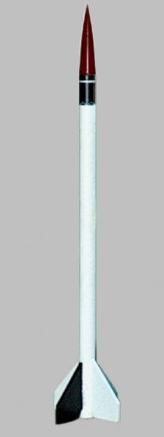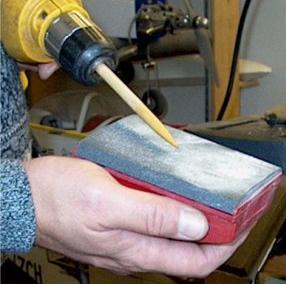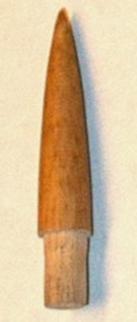
(by Carl Tulanko - 10/10/01)
 Brief:
Brief:
Nano Rocketry is one of only a few exclusive manufacturers that produce the 6mm
micro series of rockets and the only one so far I know of that produces micro
rocket kits. The Nano IQSY Tomahawk is an actual true miniature representation
of the full scale rocket, which has been modeled by many companies and tends to
be one of the more popular scale rockets around.
Construction:
The kit came in a colorful envelope, which described the contents and displayed
a picture of the final product. This is actually a KIT rather than a RTF! The
envelope contained a 6mm x 6 inch long body tube, a unfinished wood dowel for
the nosecone, Kevlar thread for shock cord, a balsa fin sheet with a template,
detailed instructions and a decal sheet. I was very impressed with the quality
of components, especially the decals as they had each bolt positioned correctly
and they were still visible for being so small. The only thing missing was a
launch lug, as with my last two kits. They really need to check their quality
control here, but I did have plenty of lug material to make my own.
Component Rating: 3 of 5

Construction begins with the shaping of the
nosecone. The Tomahawk nosecone is a very long, tapered cone, 34mm in length
not including the base. You receive a wood dowel and I used the cheaters method
for creating my own cone. I simply locked the dowel in my 3/8” Dewalt
drill and started by using a 100 grit sandpaper block for initial shape; it
went VERY fast with the drill and I highly recommend this method to all
builders for this model. Once it was close and with the dowel still in the
drill, I marked a line at 34mm and 44mm, then touched up the nose cone with a
“softer” padded sanding block and 320 grit wet/dry paper. Finally, I
hit the entire cone with two coats of thin CyA glue, then sanded once more
lightly with 320 grit sandpaper and finished with 600 grit. The nosecone came
out great, as if it were plastic coated with no grain showing at all!

In the next step, I cut the nosecone to length at the 44mm mark. Then, the 34mm mark from the tip was scored with a Zona saw by making a light, shallow cut around the entire diameter on the line. A heavy Exacto knife was used to chip away at the rear of this base, from the cut line to the end, then the base was shaped, sanded and fitted to the inside of the body tube. Once this was completed, a 1/16” hole was drilled ¼” deep into the base for the shock cord. Finally, a piece of Kevlar ® thread was glued into the drilled hole at the base of the nosecone using medium CyA.
Body tube construction was next and began by lightly sanding with 320 grit
sandpaper the outside of the body tube to remove the glazing on the glassine
layer. A fin template is included in the kit and the manufacturer apologizes
for not having the fins laser cut, but supplies plenty of high quality balsa
for the fins. Before cutting out the fins, I soaked the balsa sheet on both
sides with thin CyA and lightly sanded to smooth them out. Making the fins,
even with as small as they were, was an easy task and quickly completed. I did
stack all four fins and sanded them so each one was the exact same size as the
next.

There is actually a template printed in the manual for marking the location on the body tube for each fin, however, I found little use for the template, as “lining up by eye” seemed to work better. Apply a bead of medium CyA to the root edge of each fin and check orientation before gluing the fins to the body tube. Hold the fin to the body tube until the glue sets. A small bead of CyA should also be added to the sides of each fin for a fillet.
Once the fins are attached, you spray some CyA accelerator into the body tube, then apply a bead of CyA to the free end of the shock cord and place it about ½” deep inside the top of the body tube. I had used this method on my last Nano kits, but have since modified it. I mixed up some five minute epoxy instead, and soaked the free end tip of the Kevlar ® thread with epoxy, then globbed a nice drop of epoxy on the end of the thread. I then inserted the thread inside the top of the body tube about ¾” down the inside and let it dry. Finally, the launch lug is mounted to the side of the body tube, but my kit did not have a lug. I fabricated my own from some spare plastic tubing I had from spare material. The lug was cut to a length of ½” and sanded well for good contact; then was mounted just above the top of the fins.
Construction: 3 ½ of 5
Finishing:
I used Krylon white primer on the entire model for a basecoat, then the
nosecone was painted with Red glossy Testors spray paint. The body tube was
painted with White Krylon and the single Black fin was done with a brush and
Testors Black Acrylic. The decal sheet in the kit is very accurate, but quite
thin. Before applying, I coated the decal sheet with a coat of MicroScale Decal
Film to thicken them up a bit. They were cut out and applied easily to the body
tube and really brought out the looks of the rocket. Finally, the entire rocket
was clear-coated with Top Flite Dull Coat to seal the finish and protect the
decals.
Finish: 5 of 5
Construction Rating: 4 out of 5
Flight:
Anyone familiar with the Micro rockets knows there is only one motor available
from Quest; the MicroMaxx motors produce more than enough thrust to get even a
heavy bird airborne. In this kit, several very handy tips were given for
prepping before a launch. They recommend you use a small piece of masking tape
across the top of the motor with the edges folded over the top sides of the
motor casing to act as a “friction” fit. This method works great and
I will now use it on all my kits! Also, a template is shown in the instructions
for modifying a launch rod so the igniters can be placed in their slot inside
the launch pad; another great tip!
The motor was fitted into the base of the body tube and fit just right. The body tube is of a diameter that allows a perfect friction fit with the masking tape. This model, as with all Nano kits uses nosecone separation and freefall for recovery. I have since begun using my HPR launcher for these rockets, as it tends to light the igniters every time!
I was expecting some real performance at launch time and was not disappointed; when the button was pushed, it literally disappeared from the pad!!! It was a very fast launch and reached an estimated altitude of 200’ leaving a noticeable smoke trail to apogee; even the old hardcore rocketeers at our club were impressed with the performance.
Recovery:
A “pop” was both seen and heard at apogee, indicating nosecone
separation. The model free fell to the ground and landed safely, partially due
to the non-existent weight of the model. Upon examination, the motor was still
secure inside the body tube and the rocket faired without a scratch. A small
rod was used through the top of the body tube to push out the used motor and
the rocket was prepared again. On the second launch, performance was just as
good as the first, but the nosecone wound up pulling loose from the thread and
was lost. Another nosecone is in the build stage now, but this time I will
epoxy the cord into the nosecone’s base hole as CyA glue doesn’t
appear to bond as well.
Flight Rating: 5 out of 5
Summary:
The Nano IQSY Tomahawk is a very impressive and well detailed kit for the micro
rocketeer. The difference in performance is like night and day between these
models and the Quest RTF models. The fact that it was a kit should not stop you
from building one; assembly is very easy and a rocket can be ready to paint in
about an hour or so. I was disappointed in the lack of a launch lug again and
the decals were a bit thin, but building the fins was easy and rewarding and
allowed me to glaze them with CyA and sand them before cutting, which was a
plus. Performance is spectacular for such a small model and detail was compared
with a fellow rocketeer’s Aerotech Tomahawk; he was truly impressed. I
must say I have to recommend the Nano IQSY Tomahawk as it now has become my
favorite micro model rocket to date!
Overall Rating: 4 out of 5
Sponsored Ads
 |
 |











